Replit : Our complete review (+5 alternatives)
Replit : Our complete review (+5 alternatives)
If you're exploring software development, you've likely encountered Replit, a groundbreaking platform transforming how we create, deploy, and collaborate on applications. More than just a coding environment, Replit serves as an AI-powered hub that streamlines the development process, making software creation accessible to both beginners and experienced developers.
Founded by Amjad Masad and Michele Catasta, Replit operates out of Foster City, California, and has quickly become a preferred tool for developers seeking efficient ways to build, deploy, and manage applications.
This detailed review will cover what Replit is, its standout features and functionalities, user experience and performance, pricing options, pros and cons, and five alternatives to consider. Whether you're a student learning to code, a freelance programmer, or part of a large team, this review will help you determine if Replit is the ideal solution for your development needs.
What is Replit?
Replit is an AI-powered platform designed to simplify the process of creating, deploying, and collaborating on applications. It integrates coding, deployment, and collaboration tools into a single, user-friendly interface, removing the complexity of traditional app development environments.
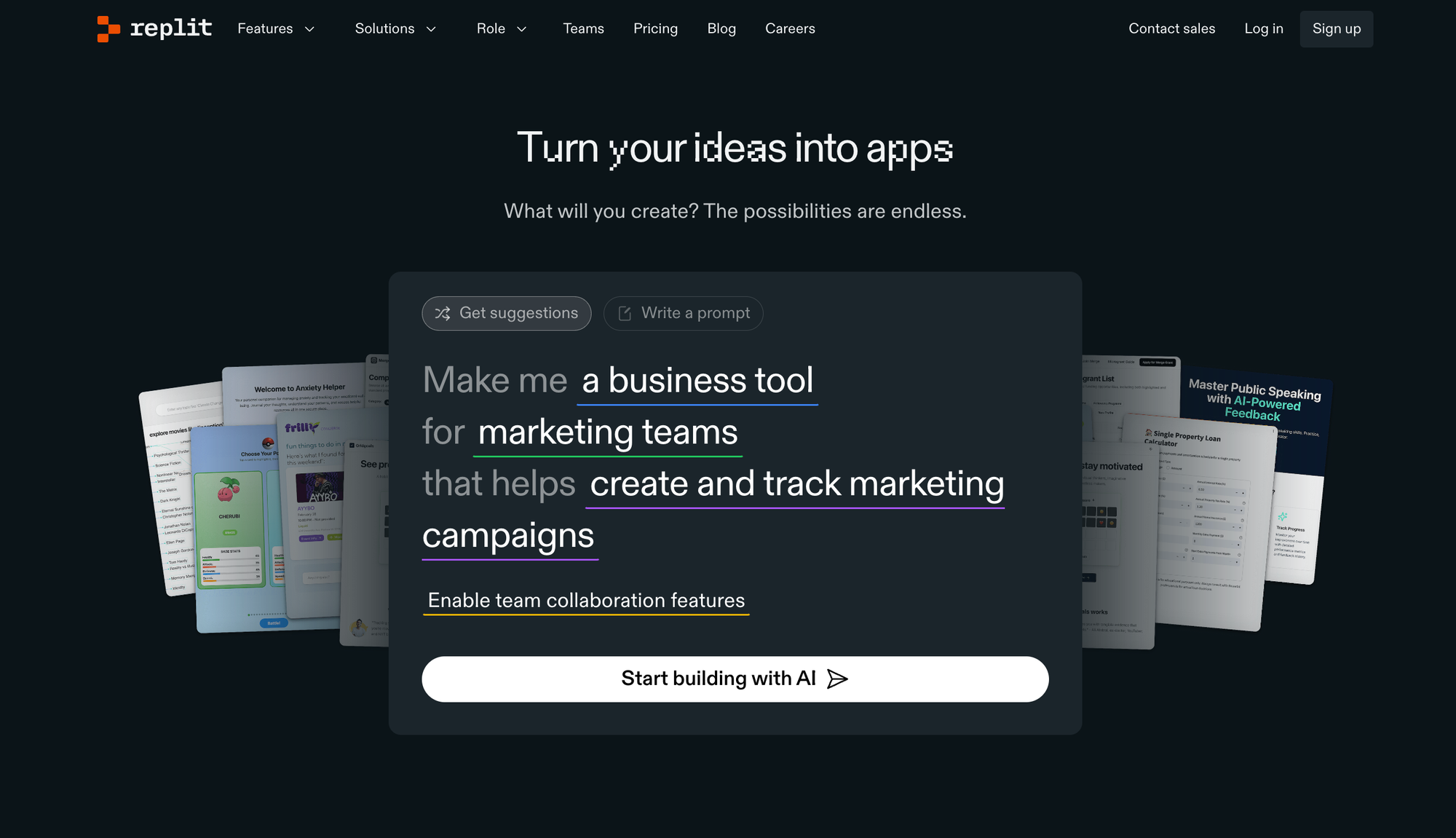
Unlike conventional development environments that often require installing various programs, languages, and packages, Replit leverages AI to automatically configure your development environment. This allows users to start building apps without extensive coding experience. The platform caters to both beginners and experienced developers, offering a comprehensive development environment suitable for all skill levels.
Workspace Features
Replit's workspace operates like an Integrated Development Environment (IDE), providing tools for creating, debugging, and managing projects. Key features include:
- Real-time preview of your app.
- Deployment options within minutes.
- A full-featured code editor.
The platform also offers a mobile app, enabling users to build and manage applications from their phones or tablets.
AI Companion Capabilities
One of Replit's standout features is its AI companion, known as the Replit AI Agent and Assistant. This AI-driven tool enhances app creation through several capabilities:
- Complete App Generation: The AI can generate entire apps and set them up based on natural language descriptions.
- Code Suggestions and Autocomplete: Provides code suggestions and autocomplete features to streamline the coding process.
- Automated Error Detection and Debugging: Assists in identifying and resolving errors, making development smoother.
- Documentation Generation: Generates documentation for your app, saving time and effort.
Language Support and Real-Time Collaboration
Replit supports over 50 programming languages, including popular ones like Python and JavaScript, as well as niche languages. This is achieved using containers and lightweight virtual environments that provide the necessary tools and libraries for each language. When starting a new project (called a "Repl"), you can select your preferred language, and Replit will create a tailored environment for you.
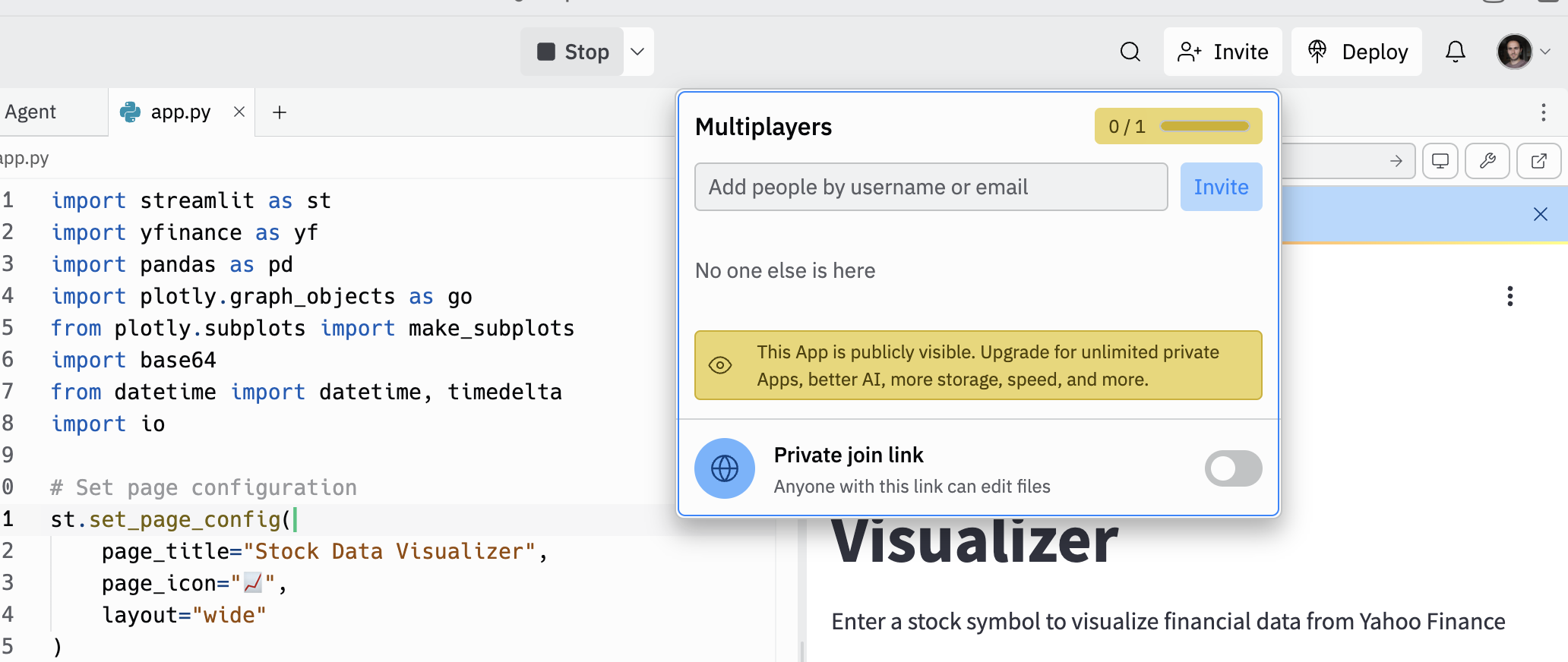
The platform also offers robust real-time collaboration features, enabling multiple users to work on the same code simultaneously. This functionality is powered by operational transformations, ensuring all changes are merged correctly and instantly reflected for all team members.
Key Features and Capabilities
Workspace Features
Replit's workspace is designed to be comprehensive and user-friendly, offering several key features that enhance the development experience. One standout feature is the real-time preview of your app, which allows you to see changes as you make them.
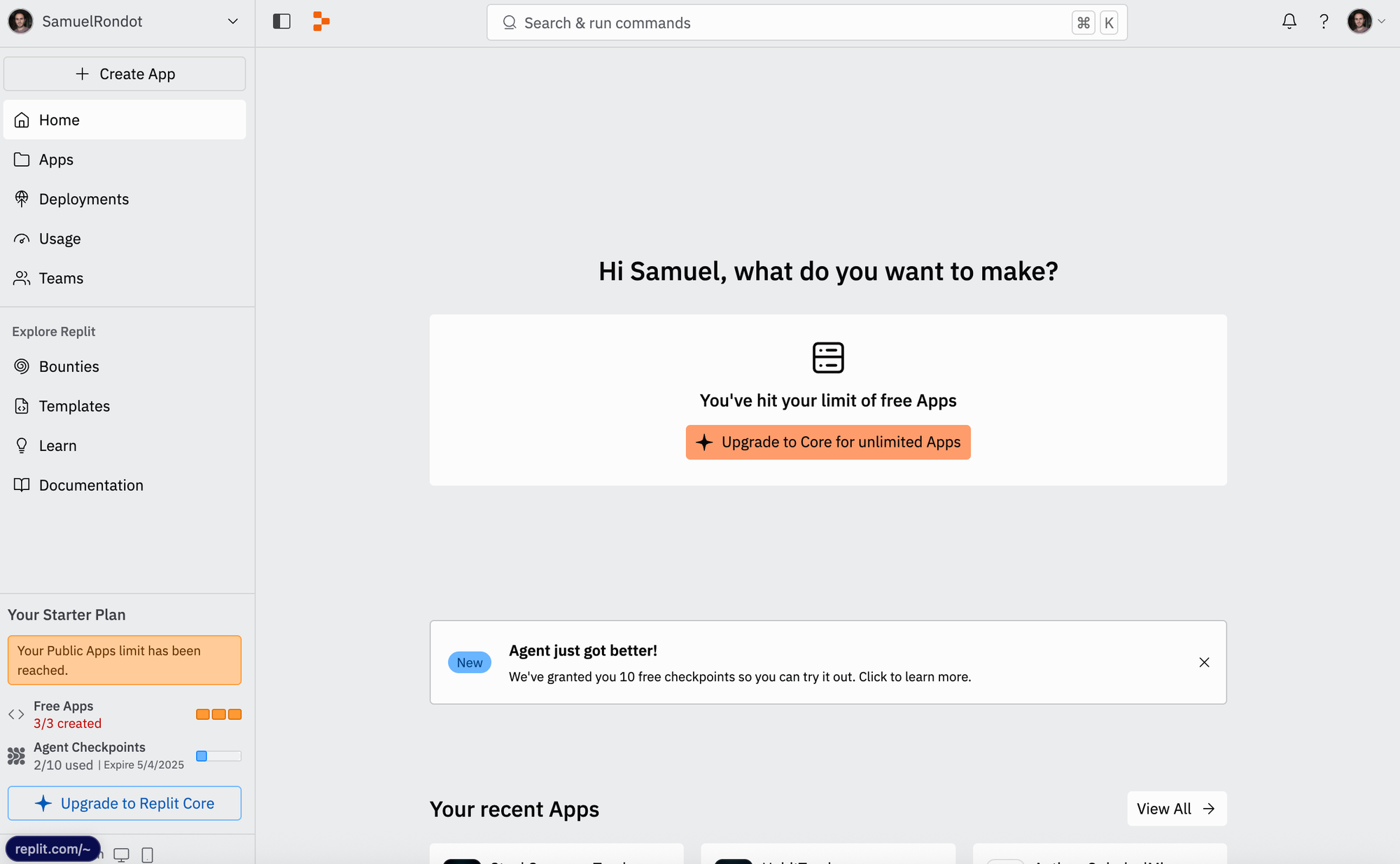
This real-time feedback is invaluable for rapid prototyping and testing. Additionally, Replit simplifies the deployment process, enabling you to deploy your applications in minutes with just a few clicks.
Full-Featured Code Editor
The platform includes a robust code editor that is accessible directly from your browser, eliminating the need for local installations. This editor is equipped with advanced features such as syntax highlighting, code completion, and debugging tools. The browser-native application ensures you can start coding immediately without any setup or configuration.
Mobile App and Cross-Device Compatibility
Replit offers a mobile app that allows you to build and manage applications from your phone or tablet. Its cross-device compatibility is particularly advantageous for developers who use multiple devices or prefer the flexibility of coding on various platforms. With Replit, you can seamlessly transition between devices without losing progress or configuration.
Version Control and Collaboration
Replit integrates version control tools, enabling you to track changes and collaborate with others in real-time. The platform supports collaborative development over the network, powered by operational transformations.
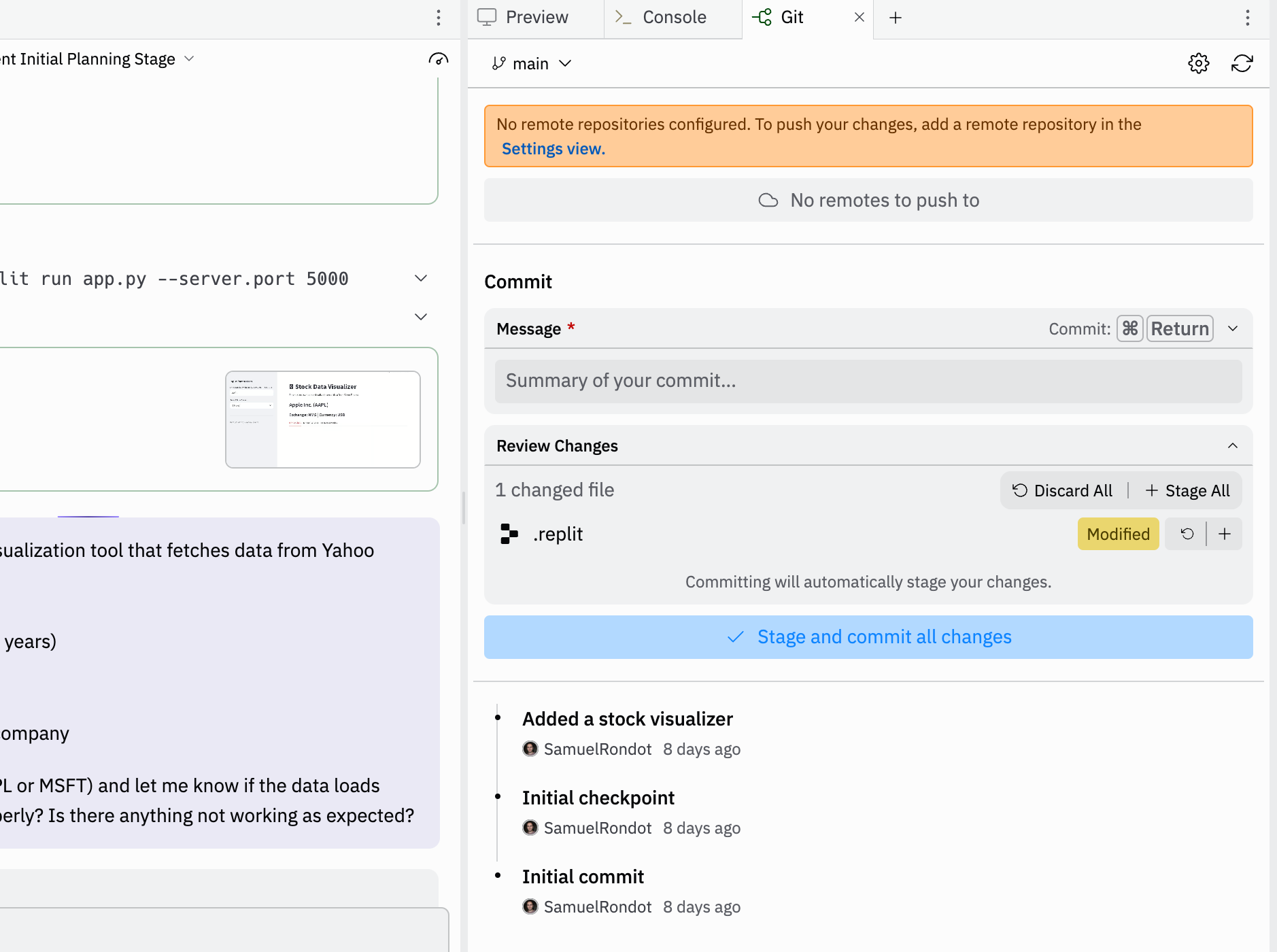
This technology ensures that multiple users can work on the same code simultaneously, with changes instantly visible to everyone. This feature is especially useful for pair programming, collaborative projects, and educational environments.
AI-Assisted Development
The Replit AI Agent and Assistant significantly accelerate app creation. Using natural language descriptions, the AI can generate complete apps and set them up effortlessly. It offers code suggestions, autocompletes code, detects and debugs errors, and even generates documentation for your app.
This AI-driven assistance is a game-changer for beginners, speeding up their learning process, and for experienced developers, as it helps tackle complex challenges more efficiently.
Template Repositories and Community Marketplace
Replit provides access to over 10,000 templates in the Replit Community Marketplace, covering diverse applications such as blockchain apps and machine learning models. These templates come with default configurations and pre-installed packages, simplifying the setup process and enabling users to start quickly. The community-driven approach fosters a collaborative learning environment where users can share, fork, and build upon existing projects.
Integration with External Services
Replit integrates seamlessly with external services like GitHub, Google, and npm, ensuring a streamlined workflow. These integrations enable you to import existing GitHub repositories, use npm packages, and access other external tools without leaving the Replit environment.
User Experience and Performance
Interface and Usability
The user experience on Replit is widely appreciated for its simplicity and ease of use. Users value the platform's clean and intuitive interface, which makes coding and project management straightforward. As a web-based tool, Replit allows developers to access their projects from any location with an internet connection, removing the need for complex installations and configurations typically required by local development environments.
Real-Time Collaboration and Feedback
Replit's real-time collaboration features stand out as a key benefit, enabling multiple users to work on the same code simultaneously. Powered by operational transformations, this feature ensures that changes are instantly visible to all team members, making it an excellent choice for collaborative projects, pair programming, and educational settings.
The interactive shell also adds value by allowing real-time testing and debugging, which is particularly helpful for quickly identifying and addressing errors.
Performance and Responsiveness
Replit is recognized for its impressive performance, marked by responsiveness and speed. Its cloud-based infrastructure ensures that projects load quickly and run efficiently, even for more complex applications.
Users have noted that the platform's real-time preview and deployment capabilities function seamlessly, facilitating rapid prototyping and testing without significant delays.
AI Assistant Integration
The integration of the Replit AI Assistant has significantly enhanced user productivity. This AI tool not only assists in debugging code but also provides clear explanations for complex issues, saving developers considerable time during the development process. Many users have found this feature invaluable for streamlining projects and creating fully functional applications rapidly, without needing to delve into every intricate detail.
Mixed Feedback on Complexity
Many users appreciate the platform for its user-friendly experience. However, some have mentioned that the interface can be challenging to navigate, particularly for individuals new to comprehensive development environments. Additionally, the code editor's auto-correction feature has received mixed reviews; while it helps streamline coding, some users find it frustrating when it automatically corrects each line of code upon pressing Enter, making subsequent edits more difficult.
Pricing and Plans
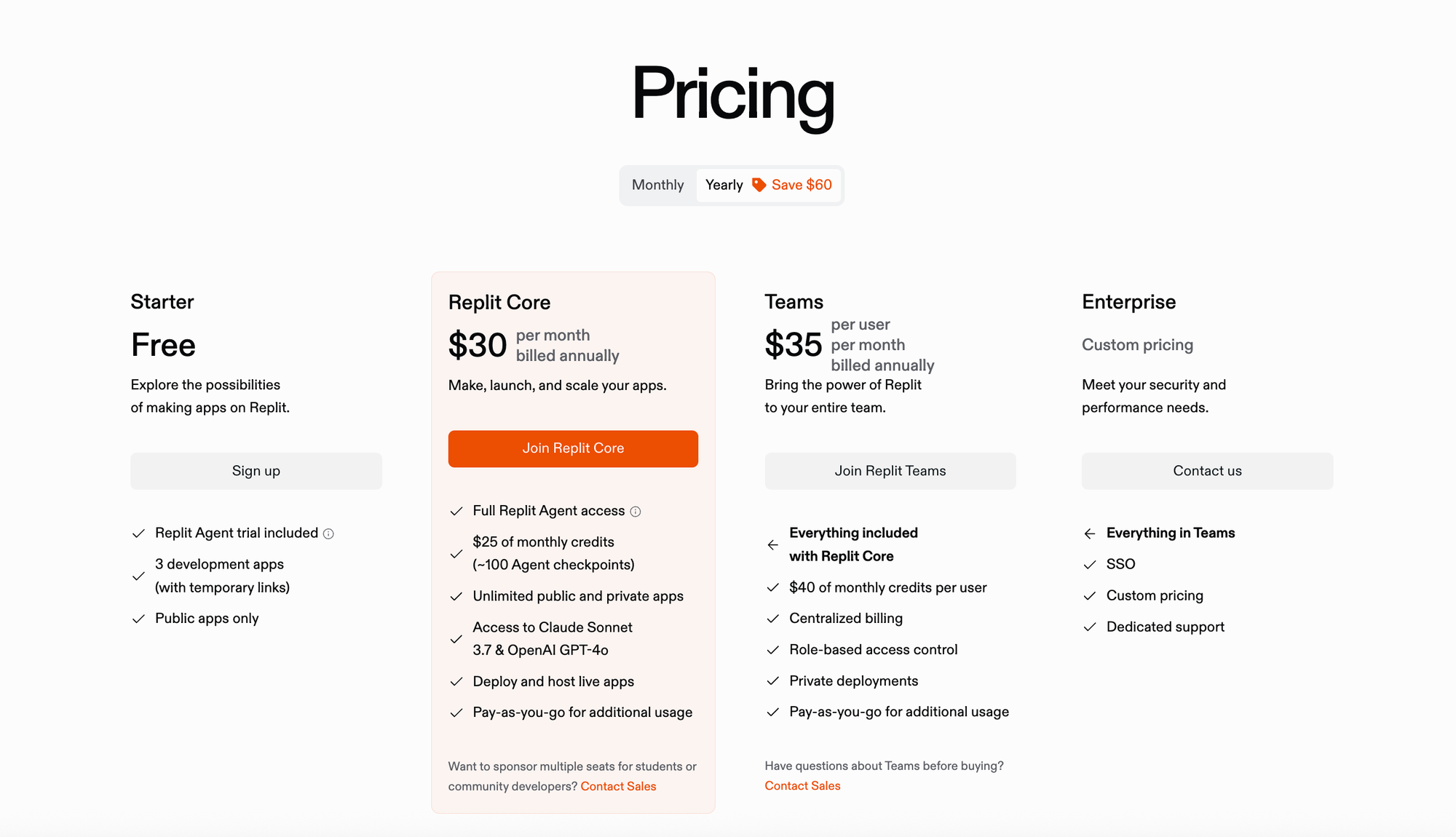
Starter Plan: Free and Beginner-Friendly
The Starter plan is Replit's free offering, crafted for beginners and those exploring the platform's capabilities. It includes a trial of the Replit Agent, enabling users to experience AI-powered features. With this plan, you can create up to three development apps, which are limited to public access and come with temporary links.
This plan is perfect for students, hobbyists, or anyone starting their journey in coding and app development.
Replit Core: The Developer’s Choice
The Replit Core plan is tailored for solo developers and serious coders, priced at $25 per month when billed annually. It provides full access to the Replit Agent, including $25 in monthly credits, which equates to approximately 100 Agent checkpoints.
Features include unlimited public and private apps, access to advanced AI models like Claude Sonnet 3.7 and OpenAI GPT-4, and the ability to deploy and host live apps. Additional usage can be paid for on a pay-as-you-go basis.
This plan is ideal for developers seeking robust tools and features to build, launch, and scale their apps effectively.
Teams Plan: For Collaborative Development
The Teams plan is designed for groups of developers, priced at $40 per user per month when billed annually. It includes all the features of the Replit Core plan, along with team-focused functionalities such as centralized billing, role-based access control, and private deployments.
Each user in the Teams plan receives $40 in monthly credits. This plan is perfect for teams that need efficient collaboration and streamlined project management under a unified billing system.
Enterprise Plan: Customized for Large Organizations
For large organizations with specific security, support, and performance needs, Replit offers a tailored Enterprise plan. This plan includes all the features of the Teams plan, plus dedicated account management, advanced security and compliance features, single sign-on (SSO) integration, and a single tenant in Google Cloud Platform (GCP).
Pricing for the Enterprise plan is customized based on the organization's requirements, providing a flexible and scalable solution for large-scale development needs.
Pros and Cons
Pros
Replit has garnered a positive reception from its users, with several key advantages that make it a popular choice among developers. Here are some of the notable pros:
Versatility and Ease of Use: Replit is praised for its intuitive interface and ease of use, making it accessible to both novice and experienced coders. The platform supports a wide range of programming languages, including Python, C, Ruby, and more, which is convenient for various projects.
Real-Time Collaboration and Feedback: The real-time collaboration features and interactive shell are highly valued. These tools allow multiple users to work on the same code simultaneously and enable real-time testing and debugging, which is essential for identifying and fixing errors quickly.
AI-Powered Development: The Replit AI Agent is a significant advantage, as it can review and edit code, generate entire apps based on natural language descriptions, and provide code suggestions. This AI assistance can significantly speed up the development process.
Cloud-Based Accessibility: Being a cloud-based platform, Replit ensures that developers can access their projects from anywhere with an internet connection, eliminating the need for complex installations and configurations associated with local development environments.
Cons
Despite its many benefits, Replit also has some notable drawbacks that users should be aware of:
Confusing UI: If Replit is great at creating basic apps, the UI might sometimes be extremely confusing in comparison to other AI coding tools like Capacity or Lovable.
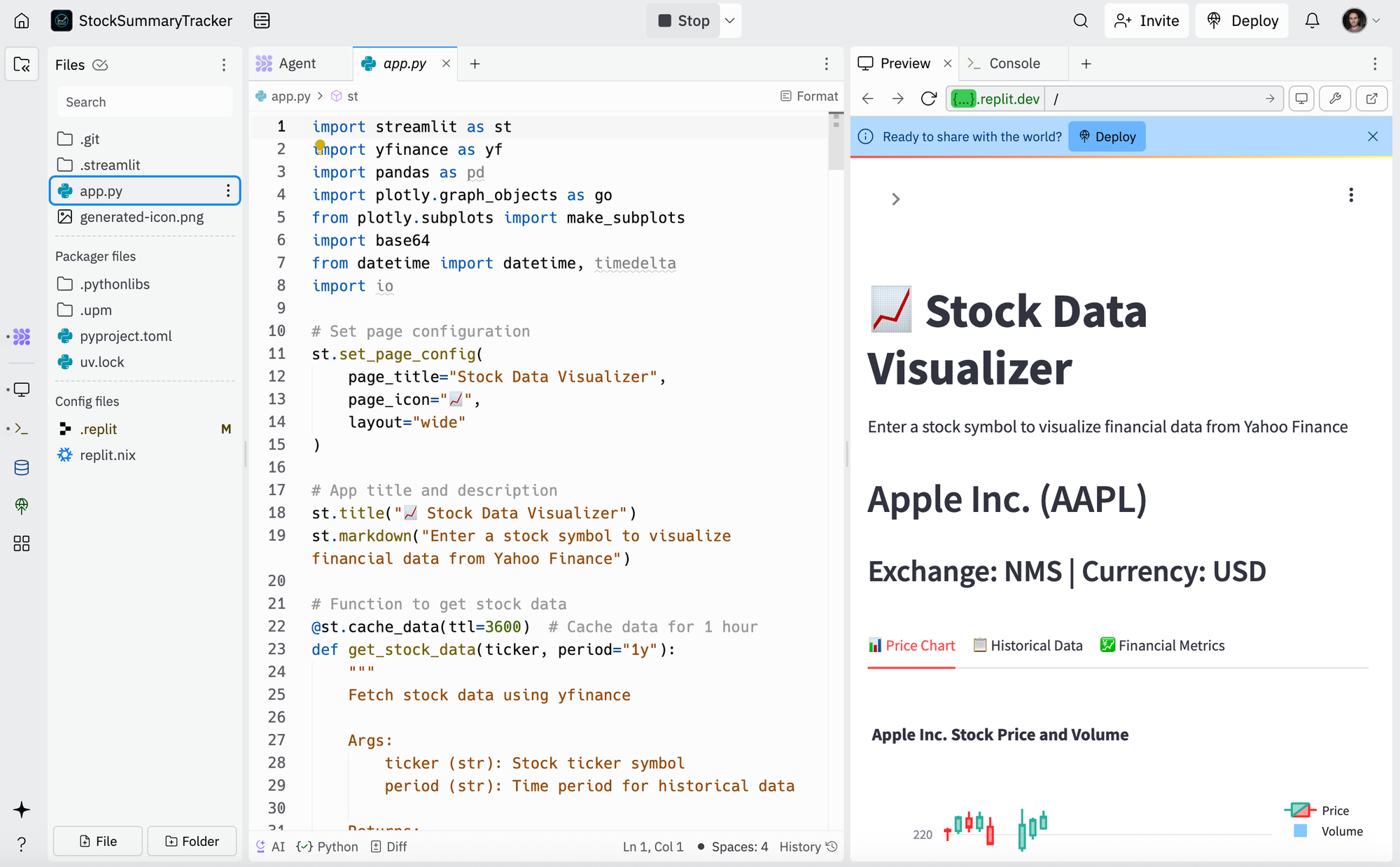
Performance Issues: Replit can struggle with performance, particularly for large and resource-intensive projects. The cloud-based infrastructure can lead to slowdowns and limitations in server resources, making it less suitable for enterprise-level software or high-performance computing tasks.
AI Assistance Limitations: While the AI coding assistance is useful, it is not always accurate. It can produce incorrect or inefficient code, introduce bugs, or sometimes fail to handle simple tasks, requiring manual corrections and potentially leading to significant debugging time.
Code Privacy Concerns: Free-tier users need to be cautious about code privacy, as their code may be visible to others. Even though private repositories are available on paid plans, this is a significant concern for developers working on proprietary or sensitive projects.
Mandatory MIT License for Public Apps: Another drawback is the mandatory MIT license requirement when publishing apps to the web, which can be a privacy and intellectual property concern for some users.
Bugs and Computing Errors: Replit, especially in its beta testing phase, has been reported to be buggy and prone to computing errors. Sometimes, the platform stops generating code altogether or requires frequent restarts of the environment, which can be frustrating for users.
5 Alternatives to Replit
1. Capacity.so
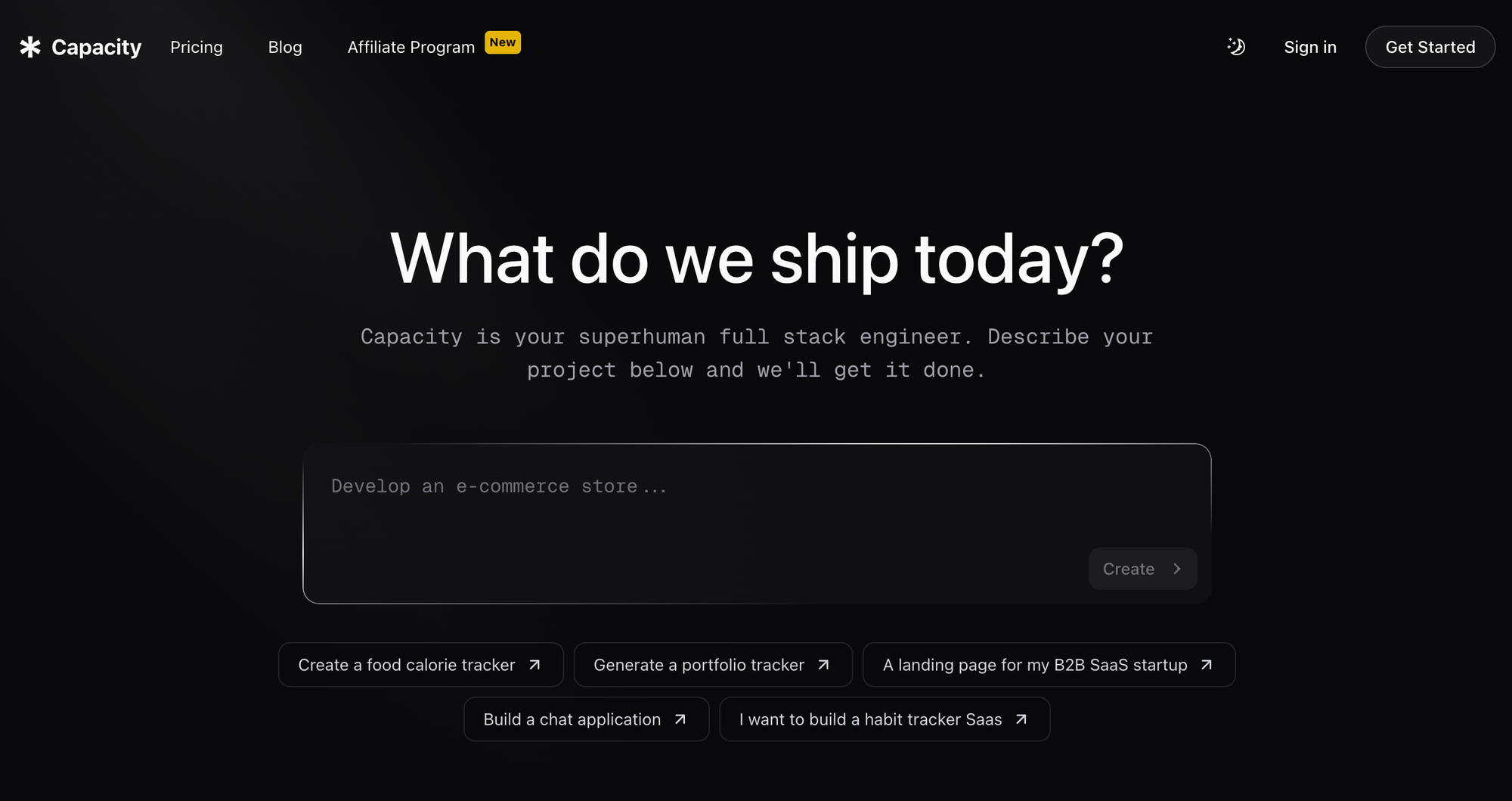
Capacity.so emerges as a compelling v0.dev alternative, distinguished primarily by its sophisticated backend infrastructure and versatile integration ecosystem. Consider these important factors:
Capacity.so harnesses cutting-edge AI models to deliver a holistic coding platform. The system excels at managing intricate projects efficiently, offering enhanced reliability and connectivity compared to v0.dev. Developers appreciate its adaptability across numerous development environments thanks to extensive integration support.
Key advantages include Capacity.so's reinforced backend architecture—critical for developing and sustaining complex applications. Its comprehensive integration framework enables fluid connectivity with external tools and platforms. Furthermore, the implementation of state-of-the-art AI models ensures superior code output quality.
Potential drawbacks center around Capacity.so's complexity, which might present a more challenging onboarding experience due to its sophisticated feature set. This could potentially overwhelm newcomers to AI-assisted development tools.
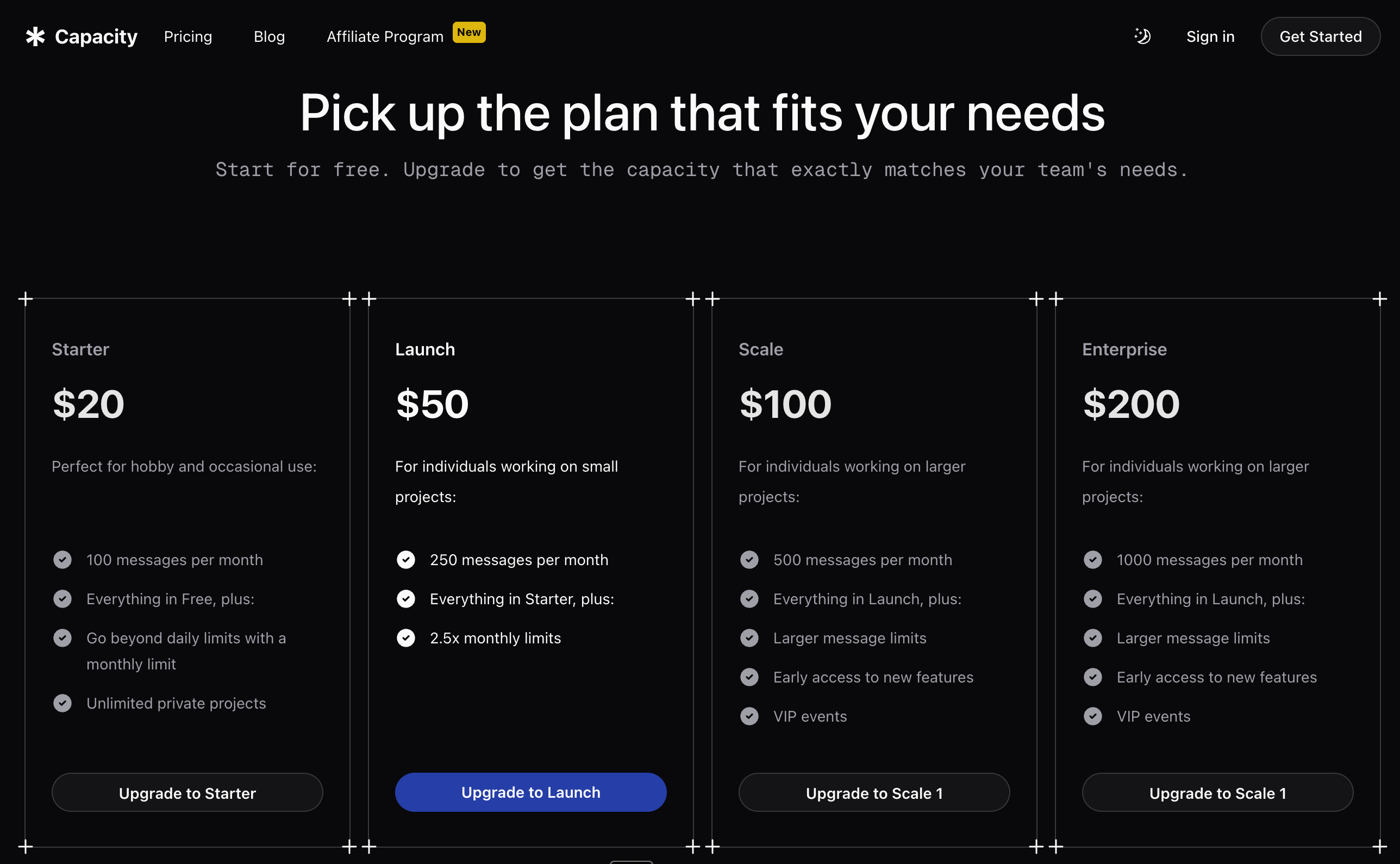
For pricing flexibility, Capacity.so provides multiple subscription tiers ranging from a free entry-level option to premium plans at $200 monthly, with varying feature access and support levels. This pricing structure accommodates projects of all scales, from individual developers to enterprise operations.
2. Hostinger Horizons
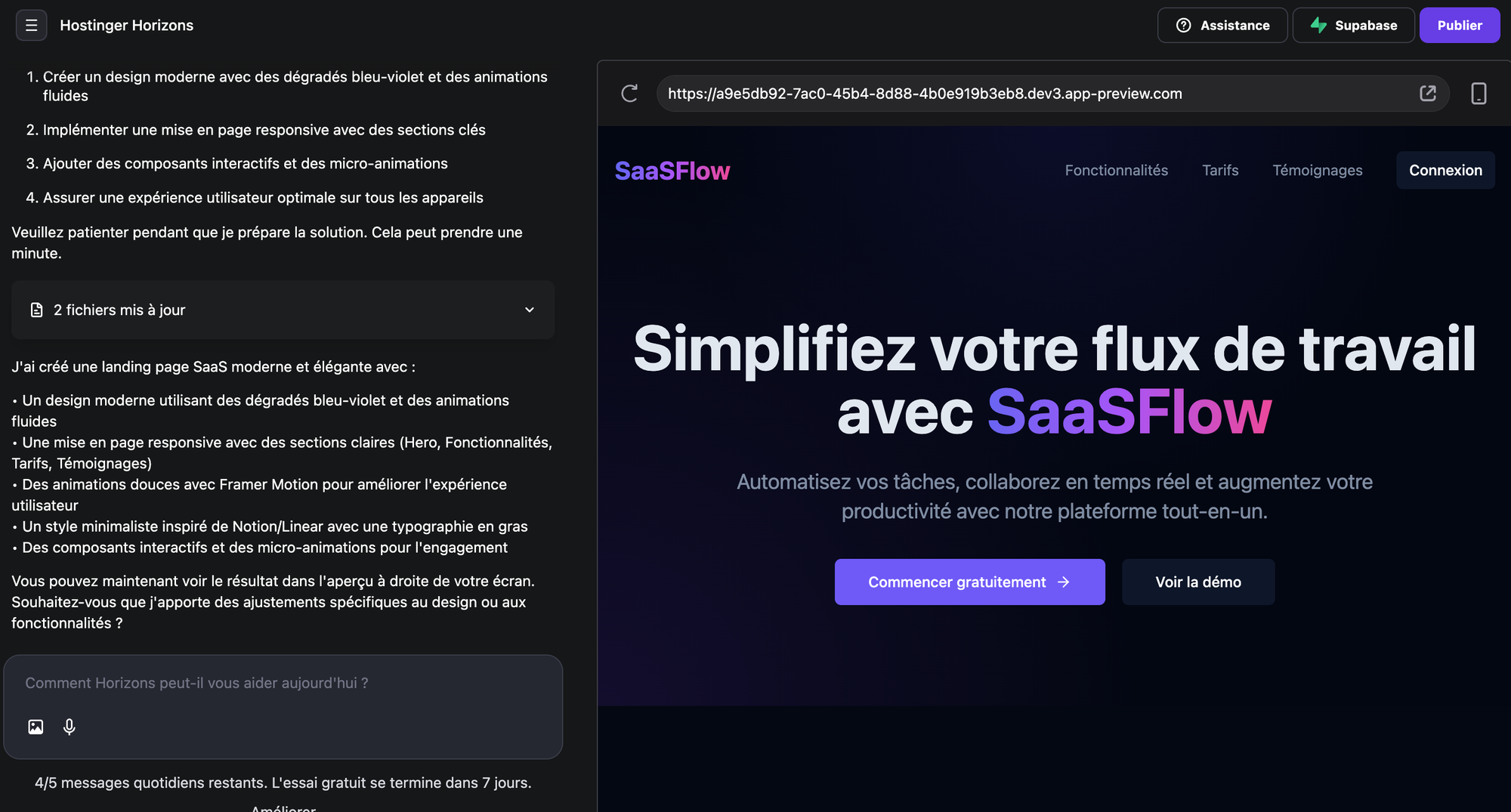
Hostinger Horizons is another strong alternative, particularly for web app development. It offers an all-in-one solution that includes hosting, domain registration, and a user-friendly coding environment.
Pros: Hostinger Horizons allows you to code, build, and publish web applications seamlessly. It requires no coding knowledge, making it ideal for beginners and non-technical users. The platform also offers real-time collaboration and deployment features.
Cons: While it is great for web app development, it may not be as versatile as Replit or Capacity in terms of supporting a wide range of programming languages and projects. Additionally, the free tier has limitations, and upgrading to paid plans may be necessary for more advanced features.
Pricing: Hostinger Horizons offers various pricing plans, including a free tier. The paid plans start at around $9 per month for basic hosting and coding features, with more advanced plans available for larger projects.
3. Lovable.dev
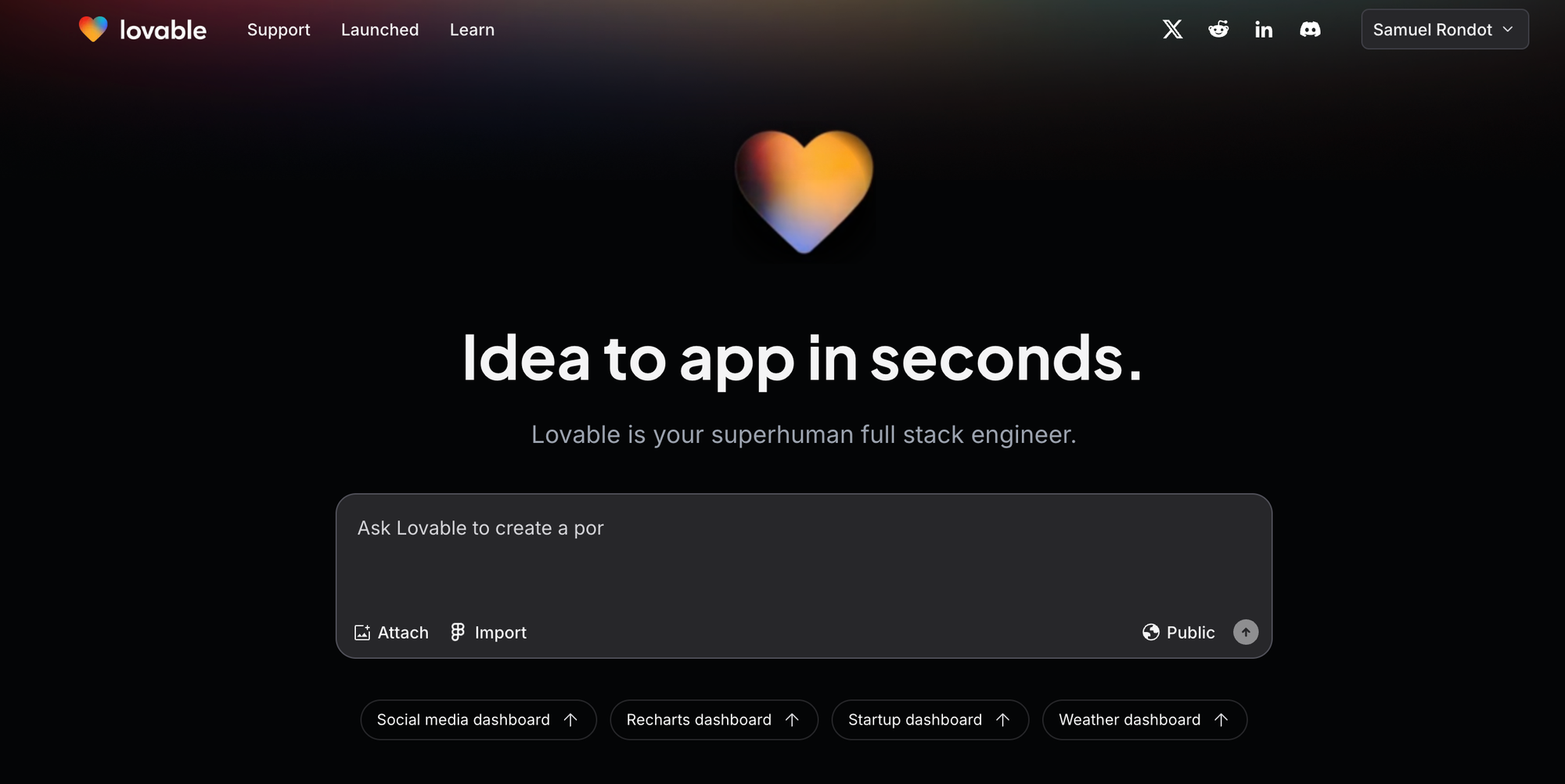
Lovable.dev presents a compelling alternative to v0.dev, particularly for projects requiring robust backend integration alongside no-code development options.
Lovable.dev merges AI-assisted programming with no-code design conversion capabilities, creating a powerful toolkit for developing high-performance applications. It excels in backend-intensive projects and offers strong connectivity with various third-party services.
Strengths: Lovable.dev performs excellently for small static applications. It provides Supabase integrations to support certain backend functions.
Limitations: While Lovable.dev demonstrates strong frontend capabilities, it may not deliver the same backend reliability as Capacity.so. Users often encounter challenges with the Supabase integration, which can lead to application stability issues.
Cost Structure: Lovable.dev provides both free and subscription-based plans, with detailed pricing available on their website. The free tier includes fundamental features, making it an excellent option for testing purposes and smaller projects.
4. CodeSandbox
CodeSandbox
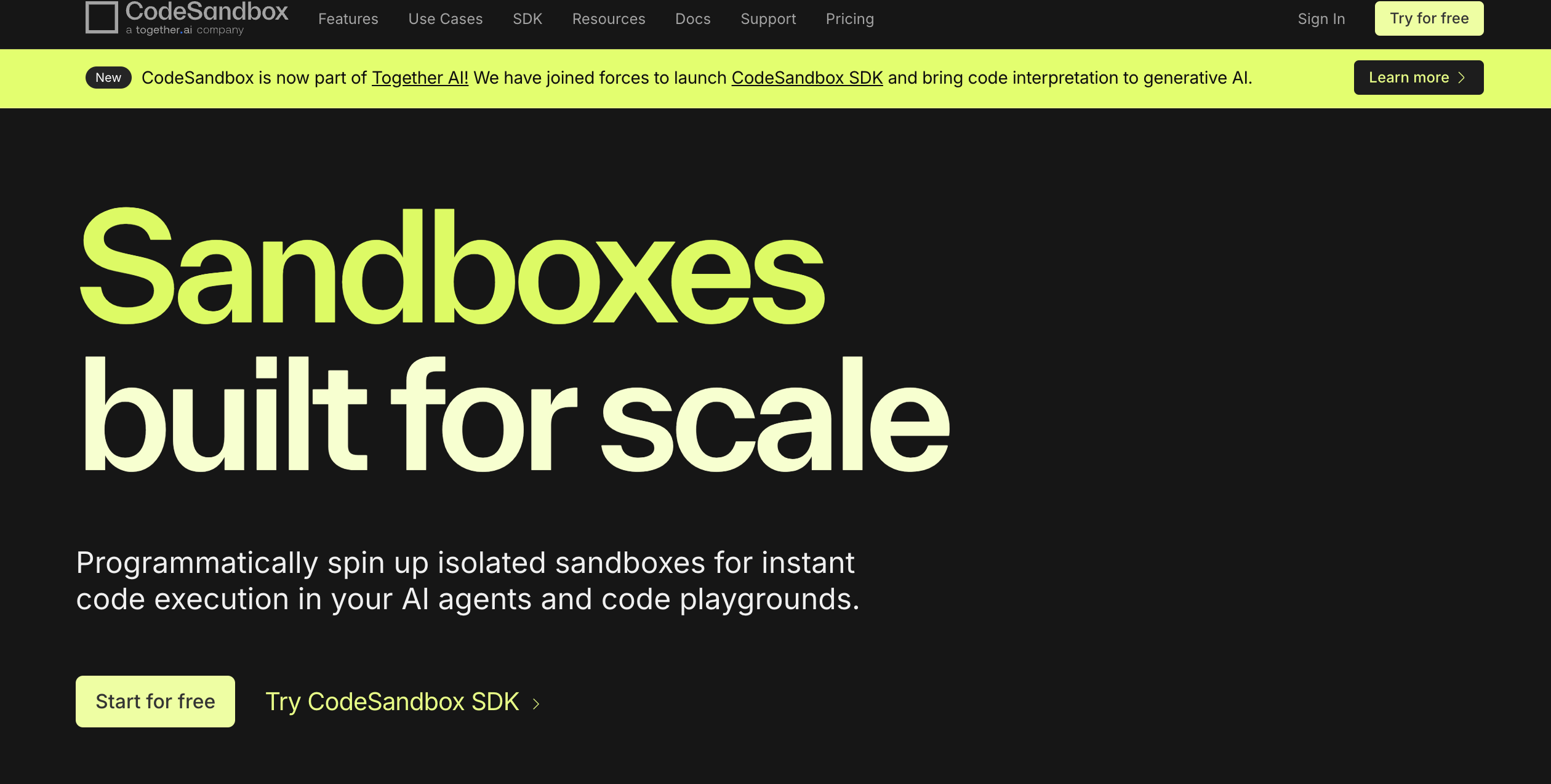
CodeSandbox is a popular alternative for web app development, offering a cloud-based coding environment with real-time collaboration and deployment features.
Pros: CodeSandbox is known for its ease of use and robust features for front-end and full-stack development. It supports a wide range of frameworks and libraries, and its real-time collaboration features make it ideal for team projects.
Cons: While CodeSandbox is excellent for web development, it may not support as many programming languages as Replit. Additionally, the free tier has limitations on private sandboxes and custom domains.
Pricing: CodeSandbox offers a free tier with limited features. The paid plans start at around $9 per month for basic features, with more advanced plans available for larger projects and teams.
5. CodePen
CodePen
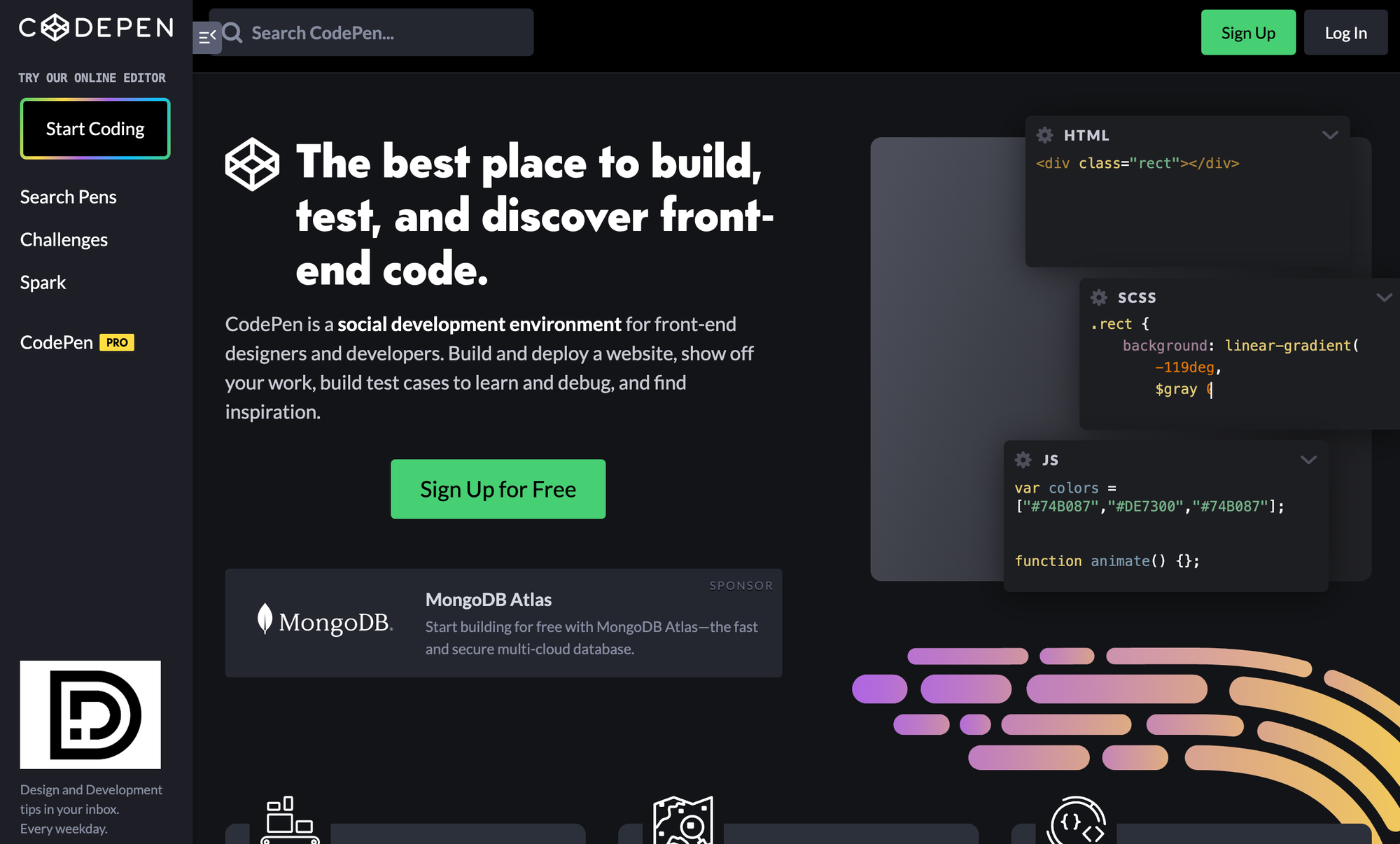
CodePen is a popular platform designed specifically for UI and front-end development. It provides a web-based coding environment with features like real-time preview and collaboration tools.
Pros: CodePen is highly regarded for its focus on front-end development, making it a great choice for designers and front-end developers. It offers features such as live preview, code completion, and access to a large community of users who share and collaborate on projects.
Cons: CodePen is more specialized and might not be as flexible as Replit for other types of projects. The free tier has certain limitations, and upgrading to a paid plan is required for features like private pens and custom domains.
Pricing: CodePen provides a free tier with limited functionality. Paid plans start at approximately $8 per month for basic features, with advanced plans available for larger projects and teams.
Use Cases and Target Audience
Use Cases for Replit
Replit is a versatile platform that can be applied across various scenarios, making it a valuable tool for different types of developers and projects. Below are some of its key use cases:
Small Static Apps and Prototyping: Replit excels in creating small static apps and rapid prototyping. Its real-time collaboration and deployment features make it ideal for quickly testing and showcasing ideas. This is especially useful for hobbyists, students, and developers who need to demonstrate concepts quickly.
Education and Learning: Replit is widely used in educational settings due to its ease of use and comprehensive features. It partners with top online educational brands, coding boot camps, and institutes to provide an interactive and accessible learning environment. This makes it a great tool for beginners and educators alike.
Sales Engineering and Demoing: Replit's ability to quickly prototype and deploy apps makes it a powerful tool for sales engineering teams. Sales engineers can use Replit to create customized workflows and demonstrate highly personalized value to customers, enhancing the sales process.
Collaborative Projects: The platform's real-time collaboration features and integrated chat make it an excellent choice for team projects. Whether it's a group of students working on a project or a remote team collaborating on a complex application, Replit facilitates seamless communication and code sharing.
Limitations in Full Stack App Development
While Replit is ideal for small static apps and prototyping, it may not be the best option for developing full-stack applications with strong backend capabilities. For such projects, alternatives like Capacity.so might be more suitable due to their robust backend integration and support.
Target Audience
Replit's target audience is diverse, encompassing several key demographics:
Developers: Replit is designed for developers of all levels, from beginners to experienced professionals. Its user-friendly interface and comprehensive features make it an attractive choice for building, deploying, and managing applications efficiently.
Remote Teams: The platform's real-time collaboration features make it ideal for remote teams. It allows team members to work on the same codebase simultaneously, facilitating better communication and project management.
Students and Educators: Replit is widely adopted in educational settings due to its ease of use and the resources it provides. It serves as a valuable tool for students learning to code and educators looking to create interactive learning environments.
Hobbyists and Freelancers: Hobbyists and freelance developers benefit from Replit's features. The platform's free tier and ease of use make it accessible for those working on personal projects or small client assignments.
Conclusion
In conclusion, Replit stands out as a powerful and accessible platform for software development, offering a unique blend of AI-powered tools, real-time collaboration, and seamless deployment. Whether you are a beginner or an experienced developer, Replit's cloud-based IDE and integrated AI assistance make it an ideal choice for a wide range of projects.
Key points to remember include its support for over 50 programming languages, real-time collaboration features, and the ability to deploy apps directly from the browser. While it has its limitations, particularly in full-stack app development, Replit remains a versatile tool that can significantly streamline your development process.
Consider exploring Replit and its alternatives to find the best fit for your coding needs and elevate your app development experience.
FAQ
How does Replit's real-time collaboration feature work, and what are its benefits for team projects?
Replit's real-time collaboration feature allows multiple users to code together simultaneously, with changes reflected instantly for everyone. This functionality is achieved through operational transformations, similar to how Google Docs operates. Users can share a unique URL (Join Links) or invite others via the Multiplayer feature, enabling synchronous collaboration, instant feedback, and centralized development for distributed teams, regardless of their location.
What are some of the common performance issues and limitations users have encountered while using Replit, especially with complex projects?
Users of Replit, particularly when working on complex projects, have encountered several performance issues and limitations, including:
- Performance Issues: Applications can hang or time out during testing, and the platform may experience lag or unresponsiveness.
- Resource-Intensive Projects: Replit can struggle with more complex and resource-intensive coding tasks.
- Slow Startup Times: The Universal Package Manager (UPM) can introduce delays, even for trivial operations, due to package guessing and other processes.
- Limited Debugging Tools: The debugging tools, while functional, are not as comprehensive as those available in some desktop IDEs.
How can users manage API keys and sensitive information securely within the Replit environment?
Users can manage API keys and sensitive information securely within the Replit environment by using the "Secrets" feature. This involves storing API keys, authentication tokens, and other sensitive data as encrypted secrets, which are not visible in the code or accessible to other users who fork or collaborate on the Repl.
These secrets can be accessed via environment variables, ensuring they remain hidden from unauthorized access.
What are the challenges and solutions for debugging code generated by the Replit Agent AI coding assistant?
The main challenge in debugging code generated by Replit Agent is that AI models, such as LLMs, can be context-dependent and may repeat initial mistakes due to their limited ability to critically evaluate previous responses. This can create a loop where the AI struggles to logically debug the code.
To address this, solutions include enhancing the AI's self-critical capabilities and improving the interface to reduce context-dependent errors. Replit AI Agent also integrates features like instant debugging, which identifies issues and offers potential fixes, as well as refined search capabilities within traces to pinpoint specific problems, significantly reducing debugging time.
